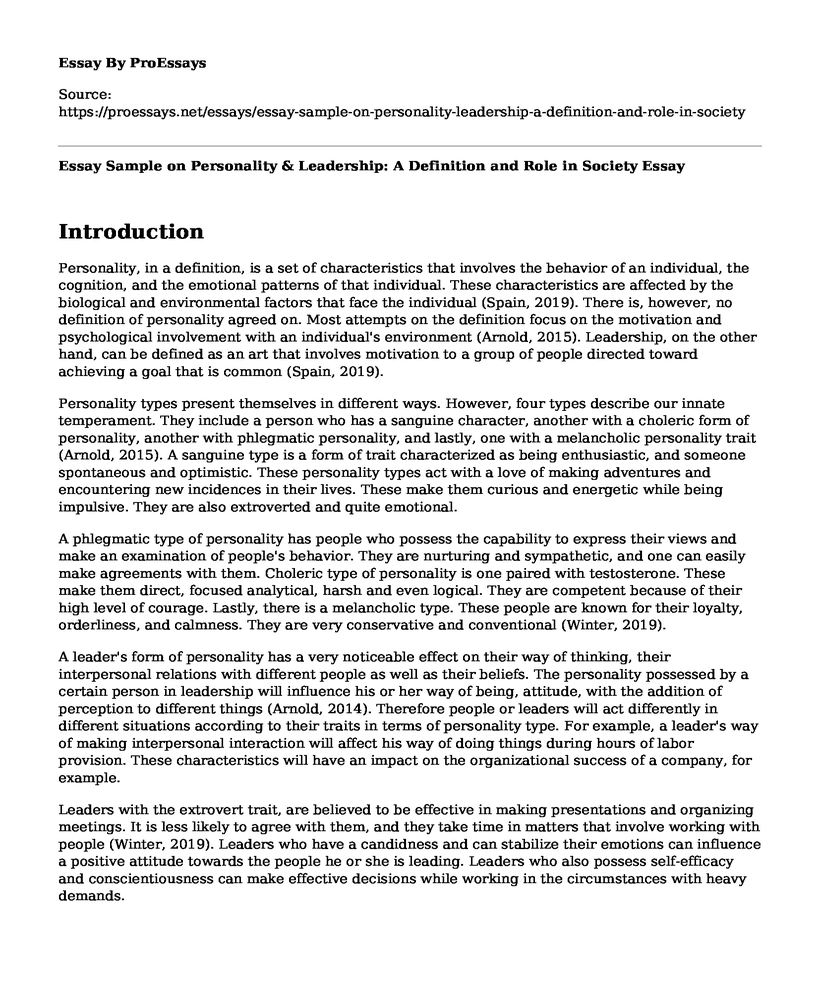Introduction
Personality, in a definition, is a set of characteristics that involves the behavior of an individual, the cognition, and the emotional patterns of that individual. These characteristics are affected by the biological and environmental factors that face the individual (Spain, 2019). There is, however, no definition of personality agreed on. Most attempts on the definition focus on the motivation and psychological involvement with an individual's environment (Arnold, 2015). Leadership, on the other hand, can be defined as an art that involves motivation to a group of people directed toward achieving a goal that is common (Spain, 2019).
Personality types present themselves in different ways. However, four types describe our innate temperament. They include a person who has a sanguine character, another with a choleric form of personality, another with phlegmatic personality, and lastly, one with a melancholic personality trait (Arnold, 2015). A sanguine type is a form of trait characterized as being enthusiastic, and someone spontaneous and optimistic. These personality types act with a love of making adventures and encountering new incidences in their lives. These make them curious and energetic while being impulsive. They are also extroverted and quite emotional.
A phlegmatic type of personality has people who possess the capability to express their views and make an examination of people's behavior. They are nurturing and sympathetic, and one can easily make agreements with them. Choleric type of personality is one paired with testosterone. These make them direct, focused analytical, harsh and even logical. They are competent because of their high level of courage. Lastly, there is a melancholic type. These people are known for their loyalty, orderliness, and calmness. They are very conservative and conventional (Winter, 2019).
A leader's form of personality has a very noticeable effect on their way of thinking, their interpersonal relations with different people as well as their beliefs. The personality possessed by a certain person in leadership will influence his or her way of being, attitude, with the addition of perception to different things (Arnold, 2014). Therefore people or leaders will act differently in different situations according to their traits in terms of personality type. For example, a leader's way of making interpersonal interaction will affect his way of doing things during hours of labor provision. These characteristics will have an impact on the organizational success of a company, for example.
Leaders with the extrovert trait, are believed to be effective in making presentations and organizing meetings. It is less likely to agree with them, and they take time in matters that involve working with people (Winter, 2019). Leaders who have a candidness and can stabilize their emotions can influence a positive attitude towards the people he or she is leading. Leaders who also possess self-efficacy and conscientiousness can make effective decisions while working in the circumstances with heavy demands.
Conclusion
Great is a leader who knows and comprehends his or her type in terms of personality. This knowledge plus understanding will help him figure out how his or her type of personality will make effects in the environments where work is done (Arnold, 2015). When a leader makes early recognition of his personality type, an opportunity will arise where he will be able to identify poor traits. This identification of those characteristics that are not positive will assist a leader to make changes into them and transform them or get rid of them to make improvements in his or her workplace. Cognitive traits, however, are difficult to alter or change. Non-cognitive traits are subject to alteration. Also, most individuals have a more-less skill of adapting their styles in line with a situation that is specific. Therefore, leaders need to study their personalities and learn how to improve to lead better.
References
Arnold, R. (2015). Leadership by Personality: Von der emotionalen zur spirituellen Fuhrung-Ein Dialog. Springer-Verlag. doi: 10.1007/978-3-658-05835-7
Spain, S. M. (2019). Leadership and Personality. Leadership, Work, and the Dark Side of Personality, 149-176. doi: 10.1016/b978-0-12-812821-3.00006-2
Winter, D. G. (2019). Leadership Personality Characteristics and Foreign Policy. International Relations. doi: 10.1093/obo/9780199743292-0256
Cite this page
Essay Sample on Personality & Leadership: A Definition and Role in Society. (2023, Mar 27). Retrieved from https://proessays.net/essays/essay-sample-on-personality-leadership-a-definition-and-role-in-society
If you are the original author of this essay and no longer wish to have it published on the ProEssays website, please click below to request its removal:
- Essay on Results of the Study on Autistic Children
- Personal Essay Sample: Experience with Mental Health Concerns (Depression)
- Paper Example on Leadership: Dave Ramsey
- Entrepreneur Analysis Paper Example
- Essay Sample on Treating Unipolar Depressive Disorder: Pharmacological & Non-Pharmacological Methods
- Teamwork Key to Red Cross National Blood Program Success - Annotated Bibliography
- Essay Example: Unraveling the Patterns and Motivations of Serial Killers







